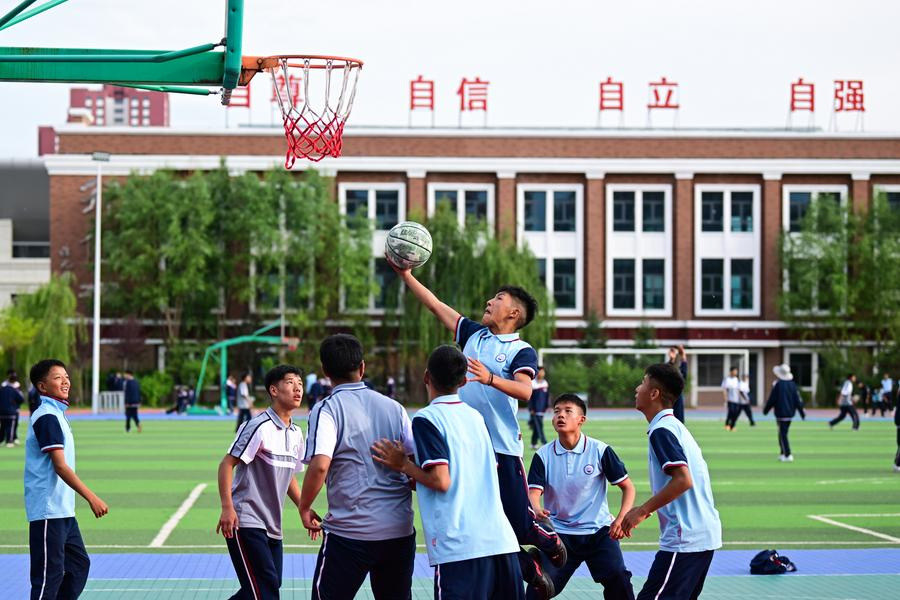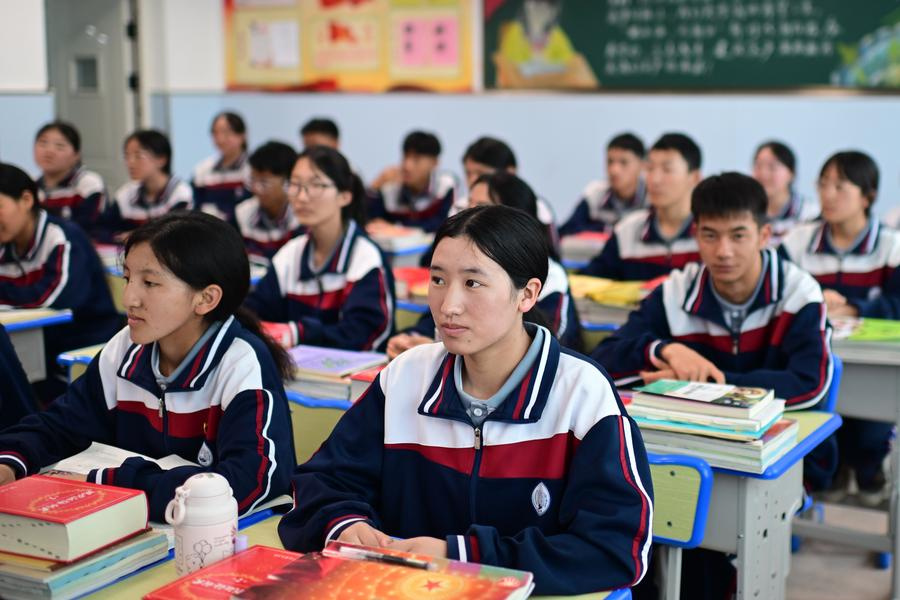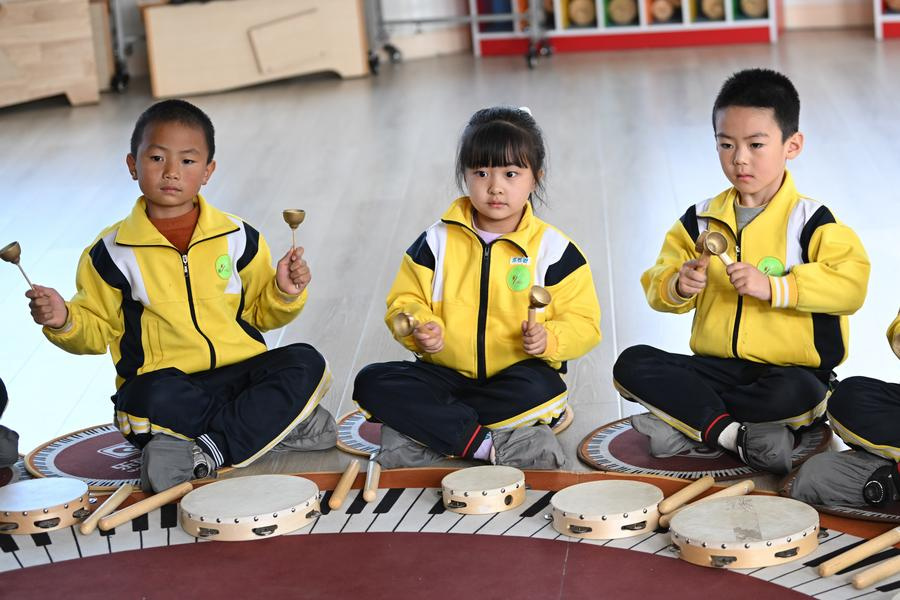Paired assistance elevates education levels in plateau province

Students play basketball at the Golog-Xining Ethnic High School, which has a paired assistance relationship with Shanghai, in Xining City, northwest China's Qinghai Province, June 18, 2024. [Xinhua/Zhang Long]
XINING -- High school student Nyidoin Lhamo, born in Bainma County in northwest China's Qinghai, spent her younger years tending livestock on the remote and vast grasslands of this province. Despite her early pastoral life, she always dreamed of exploring the world beyond.
Nestled on the Qinghai-Xizang Plateau, Nyidoin Lhamo's home is located at an altitude of over 4,000 meters in the Golog Tibetan Autonomous Prefecture.
"The county seat was the farthest place I had ever visited. However, I always longed to change my fate through the power of knowledge," she said.
To ensure that children from herding families in Golog could access high-quality educational resources like those found in the more developed eastern or coastal regions of China, a high school broke ground in 2017 under a paired assistance project with Shanghai.
Such mechanisms for collaboration between the country's eastern and western regions as well as paired assistance, particularly in education, have fueled the dreams of children in the west. These policies are significant measures to promote coordinated regional development and accelerate the development of relatively underdeveloped regions by providing support in terms of economics, technology, talent and funds, thereby narrowing the regional development gap.
Nyidoin Lhamo attends the Golog-Xining Ethnic High School, a boarding school located in Xining, the capital of Qinghai. News of the school's construction once spread like wildfire across the grasslands, as local residents eagerly anticipated better educational opportunities for their children. Schools in the provincial capital now have access to better teachers and richer teaching resources, further raising the excitement and expectations of parents.
Nyidoin Lhamo is among some 400 children from pastoral areas who have been admitted to the school since its inauguration in July 2019. Her dream moved closer to becoming reality when she was admitted to the high school last year.
Upon entering the campus, Nyidoin Lhamo was greeted by impressive teaching buildings, a new sports ground, and bright dining halls, dormitories and laboratories.
"I have arrived at a beautiful school and feel very excited. I will study hard to get into a good university," she wrote in her diary that evening.
The high school currently accommodates nearly 1,000 students, with most of them coming from herding families.

Students attend a class at the Golog-Xining Ethnic High School, which has a paired assistance relationship with Shanghai, in Xining City, northwest China's Qinghai Province, June 18, 2024. [Xinhua/Zhang Long]
Data showed that from 1996 to 2016, eastern regions of China had helped build over 7,000 schools in impoverished western regions of the country.
Paired assistance relationships between Qinghai Province and its counterparts in more developed regions include Golog with Shanghai, Haibei Tibetan Autonomous Prefecture with Shandong, Yushu Tibetan Autonomous Prefecture with Beijing, and more.
Luqing Senior High School in Haibei is another testament to such efforts.
To improve the quality of education and meet the demands of residents of Haibei, Shandong Province assisted in building the senior high school in 2021. With a total investment of 250 million yuan (about 35.2 million U.S. dollars), including over 90 million yuan in aid funds from Shandong, the school can accommodate over 2,000 students and was officially opened in Sept. 2022.
Du Xueni, 17, said school life has broadened her horizons. She already has a clear future plan -- to study law at the prestigious China University of Political Science and Law and become a lawyer.
Du attributes this plan to her frequent participation in the school's mock trials introduced by teachers from Shandong, persistent encouragement from these teachers, and her own strong language skills.
To enrich the extracurricular lives of students, teachers from Shandong also organize a variety of clubs at the school.
"Whether it's physics, chemistry, sports, dance and music, drama clubs, or traditional folk art groups... you can always find something that interests you. It's a joy that we never experienced in our previous school life," Du said.
Apart from infrastructure construction assistance from other provinces or cities, teachers from those regions have also joined paired assistance programs in many schools across the plateau province, providing advanced teaching methods and philosophies and joining hands with local colleagues to improve the education quality available to students.
Ma Defeng, a biology teacher from Shandong who has been involved in a paired assistance program at the senior high school in Haibei since February this year, was surprised by the advanced infrastructure and multimedia teaching system he encountered upon his arrival in the western plateau province.
Notably, online teaching platforms also allow the school to collaborate with schools in Shandong to share classes, high-quality courses, and even renowned teachers. Students can enjoy access to top-notch educational resources from other regions without leaving their homes, Ma said.
"Although conditions here are relatively challenging and the altitude is high, the simplicity and sincerity of the children on the plateau deeply impress me. Through educational assistance in Qinghai, I have come to know this remote place," he added.

Children attend a music class at a kindergarten, which has a paired assistance relationship with Nanjing of Jiangsu Province, in Huangyuan County of Xining City, northwest China's Qinghai Province, Nov. 29, 2023. [Xinhua/Zhang Long]
Beyond educational assistance, other collaboration and paired assistance initiatives have played a crucial role in a wide range of fields, such as the ecological environment, industry, transportation and healthcare. Within this framework, the likes of capital, skilled workers, and other resources are directed from wealthier regions to those lagging behind to help foster the development of such regions.
"These endeavors involve resource allocation and mutual assistance among various levels of local governments under the overall coordination of higher-level governments," said Li Kai, an official from Shandong, who is now participating in the paired assistance program in Qinghai.
"Future paired assistance projects with Qinghai will continue to deepen and expand," Li added.
























